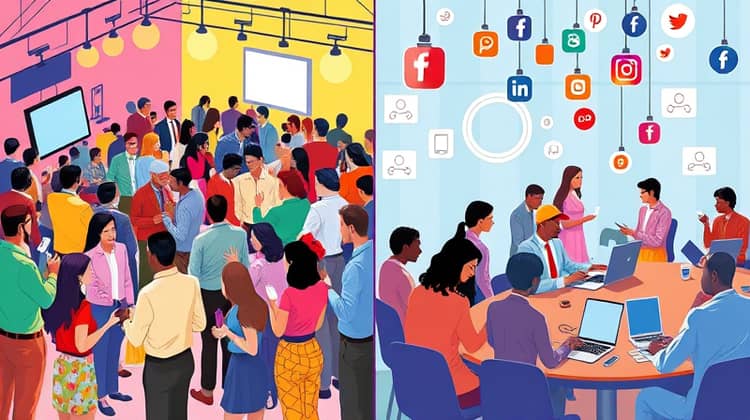As we dive into the details of networking, it becomes evident that building interpersonal relationships is paramount in both personal and professional settings. Networking not only opens doors to new opportunities but also cultivates growth and development in various facets of life.
Effective networking is about establishing mutual connections, where both parties benefit from the relationship. Whether it's sharing ideas, resources, or support, networking plays a key role in enhancing one's career trajectory and personal advancement.
1. Understanding Networking

Networking is commonly defined as the act of creating and nurturing professional relationships with individuals who can offer guidance, mentorship, and support throughout your career.
It encompasses a wide range of activities, from casual conversations at social gatherings to formal networking events aimed at professional growth. Understanding the importance of networking is crucial in navigating today's job market.
- Networking helps to build relationships that can lead to job opportunities.
- It provides access to insider information about industries and companies.
- Networking can enhance your visibility and reputation in your field.
- It fosters collaboration and knowledge sharing among peers.
2. Building and Expanding Your Network

Effective networking begins with identifying the right individuals to connect with. This may include colleagues, industry leaders, and even peers in similar or complementary fields.
Once you've identified potential contacts, the next step is to take initiative and reach out, whether through email, social media, or in-person meetings.
- Join professional organizations related to your field.
- Attend industry conferences and workshops.
- Leverage social media platforms like LinkedIn.
- Consider volunteering for committees or boards.
3. Career Advancement

Networking is not just about meeting new people; it’s also about reaping the rewards of those connections. Building a strong network can significantly influence your career trajectory.
Through networking, you can access job openings, gain referrals, and receive mentorship opportunities that can help you advance in your career.
- Connect with industry professionals for potential job leads.
- Seek mentorship from experienced individuals.
- Participate in industry events to enhance your presence.
4. Gaining New Perspectives

Networking allows you to interact with a diverse group of people and gain insights that you might not have considered before.
- Engage in discussions with professionals from different fields.
- Attend seminars to broaden your understanding of industry trends.
- Participate in forums and online groups to exchange ideas.
This exchange of ideas encourages innovation and can inspire you to think outside the box in your own work.
5. Enhancing Your Skill Set

Networking often leads to opportunities for professional development. Whether through workshops, training sessions, or informal knowledge sharing, your network can be a valuable resource.
Engaging with others allows you to identify gaps in your skillset and learn from those who may have overcome similar challenges.
- Participate in workshops conducted by industry experts.
- Seek feedback from peers and mentors on your skills.
- Collaborate with others on projects to enhance your capabilities.
6. Finding Opportunities

A robust network can be instrumental in helping you uncover new job opportunities or collaborations. Oftentimes, jobs are filled through referrals rather than traditional applications.
This underscores the importance of nurturing a network that includes people from various levels within and outside your industry.
- Network within your current organization to explore internal opportunities.
- Engage with recruitment professionals to learn about openings.
- Stay informed about industry trends to spot emerging opportunities.
Ultimately, the more connections you have, the broader your access to opportunities becomes.
7. Creating a Support System

A well-established network serves as a support system during challenging times in your career. Whether you're facing job loss, career transitions, or personal challenges, having people to lean on can make a significant difference.
Strengthening your connections can lead to long-lasting relationships where both parties support one another in achieving their goals.
8. Online vs. Offline Networking

In today's digital age, networking has evolved significantly with the rise of online platforms. While in-person networking remains valuable, online networking offers unique opportunities for reaching out to a broader audience.
Understanding the balance between online and offline networking can enhance your overall networking strategy.
- Use social media for expanding your reach and visibility.
- Participate in webinars and virtual events.
- Utilize professional networking sites for connecting with industry peers.
9. Tips for Effective Networking

To maximize the benefits of networking, it's crucial to approach it strategically. Being genuine and authentic when connecting with others can lead to more meaningful relationships.
Remember to follow up and maintain engagements with your contacts to build lasting connections.
- Prepare your elevator pitch before events.
- Follow up after meetings with a personalized message.
- Engage with your network by sharing valuable resources.
- Attend regularly scheduled networking events.
10. Networking for Introverts

Networking can be particularly daunting for introverts, as traditional networking events often revolve around socializing in large groups. However, introverts can successfully navigate networking by leveraging their strengths and focusing on one-on-one interactions.
It’s important to remember that networking doesn’t have to be overwhelming or force you outside of your comfort zone.
- Practice your introduction and talking points beforehand.
- Look for events with structured formats to ease engagement.
- Seek out intimate gatherings for more meaningful connections.
Additionally, introverts should take the time to reflect on their networking experiences and identify strategies that work best for them. With patience and practice, networking can become an invaluable tool for career development.














